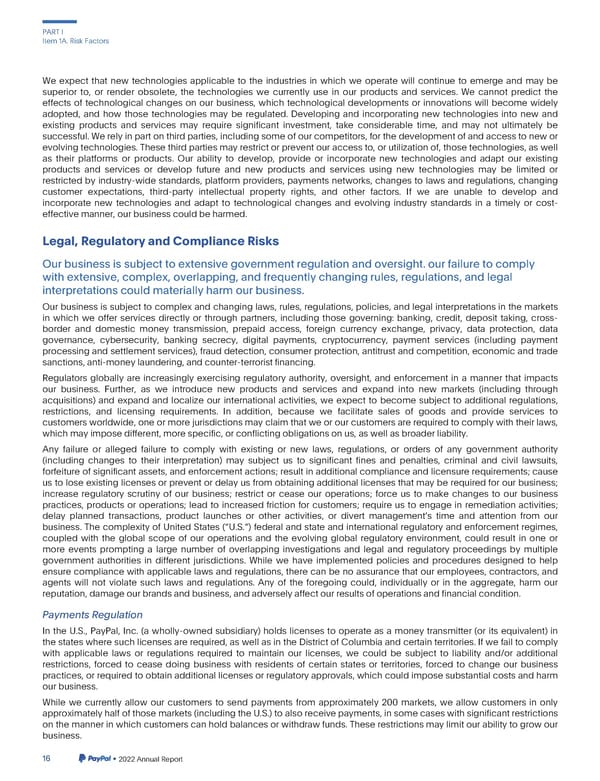PARTI Item1A.RiskFactors Weexpect that new technologies applicable to the industries in which we operate will continue to emerge and may be superior to, or render obsolete, the technologies we currently use in our products and services. We cannot predict the effects of technological changes on our business, which technological developments or innovations will become widely adopted, and how those technologies may be regulated. Developing and incorporating new technologies into new and existing products and services may require significant investment, take considerable time, and may not ultimately be successful.Werelyinpartonthirdparties,includingsomeofourcompetitors,forthedevelopmentofandaccesstonewor evolving technologies.These third parties may restrict or prevent our access to, or utilization of, those technologies, as well as their platforms or products. Our ability to develop, provide or incorporate new technologies and adapt our existing products and services or develop future and new products and services using new technologies may be limited or restricted by industry-wide standards, platform providers, payments networks, changes to laws and regulations, changing customer expectations, third-party intellectual property rights, and other factors. If we are unable to develop and incorporate new technologies and adapt to technological changes and evolving industry standards in a timely or cost- effective manner, our businesscould be harmed. Legal,RegulatoryandComplianceRisks Ourbusinessissubjecttoextensivegovernmentregulationandoversight.ourfailuretocomply withextensive,complex,overlapping,andfrequentlychangingrules,regulations,andlegal interpretations could materially harm our business. Our business is subject to complex and changing laws, rules, regulations, policies, and legal interpretations in the markets in which we offer services directly or through partners, including those governing: banking, credit, deposit taking, cross- border and domestic money transmission, prepaid access, foreign currency exchange, privacy, data protection, data governance, cybersecurity, banking secrecy, digital payments, cryptocurrency, payment services (including payment processing and settlement services), fraud detection, consumer protection, antitrust and competition, economic and trade sanctions,anti-moneylaundering,andcounter-terroristfinancing. Regulators globally are increasingly exercising regulatory authority, oversight, and enforcement in a manner that impacts our business. Further, as we introduce new products and services and expand into new markets (including through acquisitions) and expand and localize our international activities, we expect to become subject to additional regulations, restrictions, and licensing requirements. In addition, because we facilitate sales of goods and provide services to customersworldwide,oneormorejurisdictionsmayclaimthatweorourcustomersarerequiredtocomplywiththeirlaws, whichmayimposedifferent,morespecific,orconflictingobligationsonus,aswellasbroaderliability. Any failure or alleged failure to comply with existing or new laws, regulations, or orders of any government authority (including changes to their interpretation) may subject us to significant fines and penalties, criminal and civil lawsuits, forfeiture of significant assets, and enforcement actions; result in additional compliance and licensure requirements; cause us to lose existing licenses or prevent or delay us from obtaining additional licenses that may be required for our business; increase regulatory scrutiny of our business; restrict or cease our operations; force us to make changes to our business practices, products or operations; lead to increased friction for customers; require us to engage in remediation activities; delay planned transactions, product launches or other activities, or divert managements time and attention from our business. The complexity of United States (“U.S.”) federal and state and international regulatory and enforcement regimes, coupled with the global scope of our operations and the evolving global regulatory environment, could result in one or more events prompting a large number of overlapping investigations and legal and regulatory proceedings by multiple government authorities in different jurisdictions. While we have implemented policies and procedures designed to help ensure compliance with applicable laws and regulations, there can be no assurance that our employees, contractors, and agents will not violate such laws and regulations. Any of the foregoing could, individually or in the aggregate, harm our reputation, damageourbrandsandbusiness,andadverselyaffectourresultsofoperationsandfinancialcondition. PaymentsRegulation In the U.S., PayPal, Inc. (a wholly-owned subsidiary) holds licenses to operate as a money transmitter (or its equivalent) in the states where such licenses are required, as well as in the District of Columbia and certain territories. If we fail to comply with applicable laws or regulations required to maintain our licenses, we could be subject to liability and/or additional restrictions, forced to cease doing business with residents of certain states or territories, forced to change our business practices, or required to obtain additional licenses or regulatory approvals, which could impose substantial costs and harm ourbusiness. While we currently allow our customers to send payments from approximately 200 markets, we allow customers in only approximatelyhalf of those markets(includingthe U.S.) to also receive payments,in some caseswith significantrestrictions onthemannerinwhichcustomerscanholdbalancesorwithdrawfunds.Theserestrictionsmaylimitourabilitytogrowour business. 16 •2022AnnualReport
 2023 Annual Report Page 163 Page 165
2023 Annual Report Page 163 Page 165